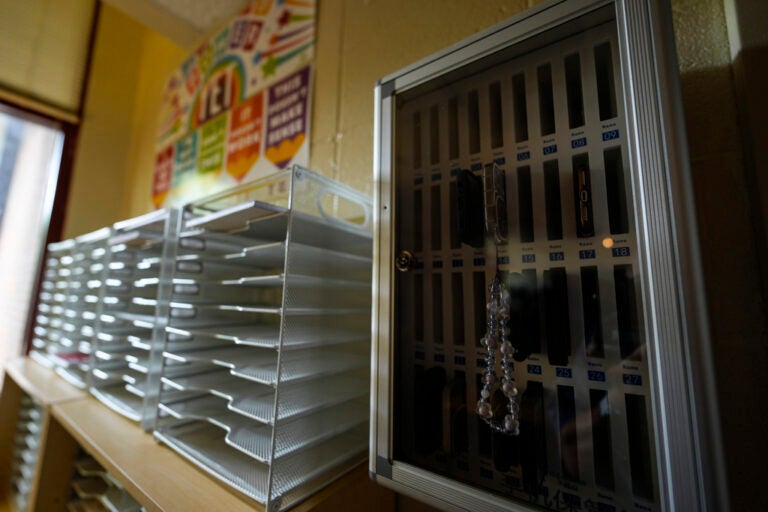Education
New Jersey Panel Proposes Comprehensive Cell Phone Ban in Schools

A newly released report by the New Jersey Commission on the Effects of Social Media Usage on Adolescents recommends a comprehensive “bell-to-bell” ban on cell phones in schools. This proposal aims to address the growing concerns regarding the impact of social media on students’ mental health and academic performance.
The commission’s report advocates that local school districts should have the authority to implement these bans, which would extend to students’ use of mobile devices on school buses, during school-sanctioned events, lunchtime, and between classes. The panel included a diverse group comprising students, parents, education professionals, and mental health experts.
Assemblyman Cody Miller, a Democrat from Gloucester County, is sponsoring legislative efforts to regulate online student activity. He emphasized that there is no “one-size-fits-all” approach to managing cell phone use in schools. Miller’s legislation directs the New Jersey Department of Education to develop guidelines for controlling cell phone and social media use during instructional time, granting school districts the flexibility to tailor policies according to their unique situations.
Miller also noted that the bill allows exceptions for students with documented medical conditions requiring access to their phones.
Impact of Social Media on Youth Mental Health
The report highlights significant concerns regarding the effects of social media on children aged 10 to 19, noting that it can contribute to increased levels of anxiety, depression, and feelings of loneliness. Stephanie Marcello, Chief Psychologist at Rutgers University Behavioral Health Care, indicated that social media use can negatively affect students’ social-emotional well-being and academic performance.
“Social media exposure can impede academic learning and attention spans,” Marcello stated. “It hinders the ability of young people to engage effectively with their peers and their environment.”
Currently, schools in Cherry Hill have already adopted a ban on cell phones. Miller emphasized the necessity of limiting access to devices, stating that educators often struggle to manage classroom behavior due to students’ constant access to their phones. Data reveals that a large majority of students visit social media sites daily, and nearly 50% of teens report being online almost constantly.
Recommendations for Addressing Digital Behavior
The commission’s report also urges school districts to prioritize education on digital citizenship and media literacy. It includes recommendations for healthcare providers to screen adolescents for signs of “problematic social media use” to identify risks and provide early intervention.
Co-chairs of the commission, Pearl Gabel and Charles Gelinas, described the report as a “roadmap for action.” They emphasized, “Social media has rewired childhood, and the stakes could not be higher.”
In a statement, New Jersey Governor Phil Murphy expressed his support for the ban during his State of the State address in January 2024, asserting that cell phone distractions impede learning.
Miller anticipates bipartisan support for his bill and expects it to be presented for a vote in the coming weeks. An identical measure has already passed in the New Jersey state Senate earlier this year.
As discussions about the balance between technology and education continue, the New Jersey commission’s recommendations may herald significant changes in how schools approach cell phone usage, aiming to safeguard students’ mental health and academic integrity.
-

 Technology5 months ago
Technology5 months agoDiscover the Top 10 Calorie Counting Apps of 2025
-

 Health2 months ago
Health2 months agoBella Hadid Shares Health Update After Treatment for Lyme Disease
-

 Health3 months ago
Health3 months agoErin Bates Shares Recovery Update Following Sepsis Complications
-

 Technology4 months ago
Technology4 months agoDiscover How to Reverse Image Search Using ChatGPT Effortlessly
-

 Technology1 month ago
Technology1 month agoDiscover 2025’s Top GPUs for Exceptional 4K Gaming Performance
-

 Technology2 months ago
Technology2 months agoElectric Moto Influencer Surronster Arrested in Tijuana
-

 Technology5 months ago
Technology5 months agoMeta Initiates $60B AI Data Center Expansion, Starting in Ohio
-

 Technology5 months ago
Technology5 months agoRecovering a Suspended TikTok Account: A Step-by-Step Guide
-

 Health4 months ago
Health4 months agoTested: Rab Firewall Mountain Jacket Survives Harsh Conditions
-

 Lifestyle5 months ago
Lifestyle5 months agoBelton Family Reunites After Daughter Survives Hill Country Floods
-

 Technology4 months ago
Technology4 months agoHarmonic Launches AI Chatbot App to Transform Mathematical Reasoning
-

 Technology3 months ago
Technology3 months agoUncovering the Top Five Most Challenging Motorcycles to Ride









